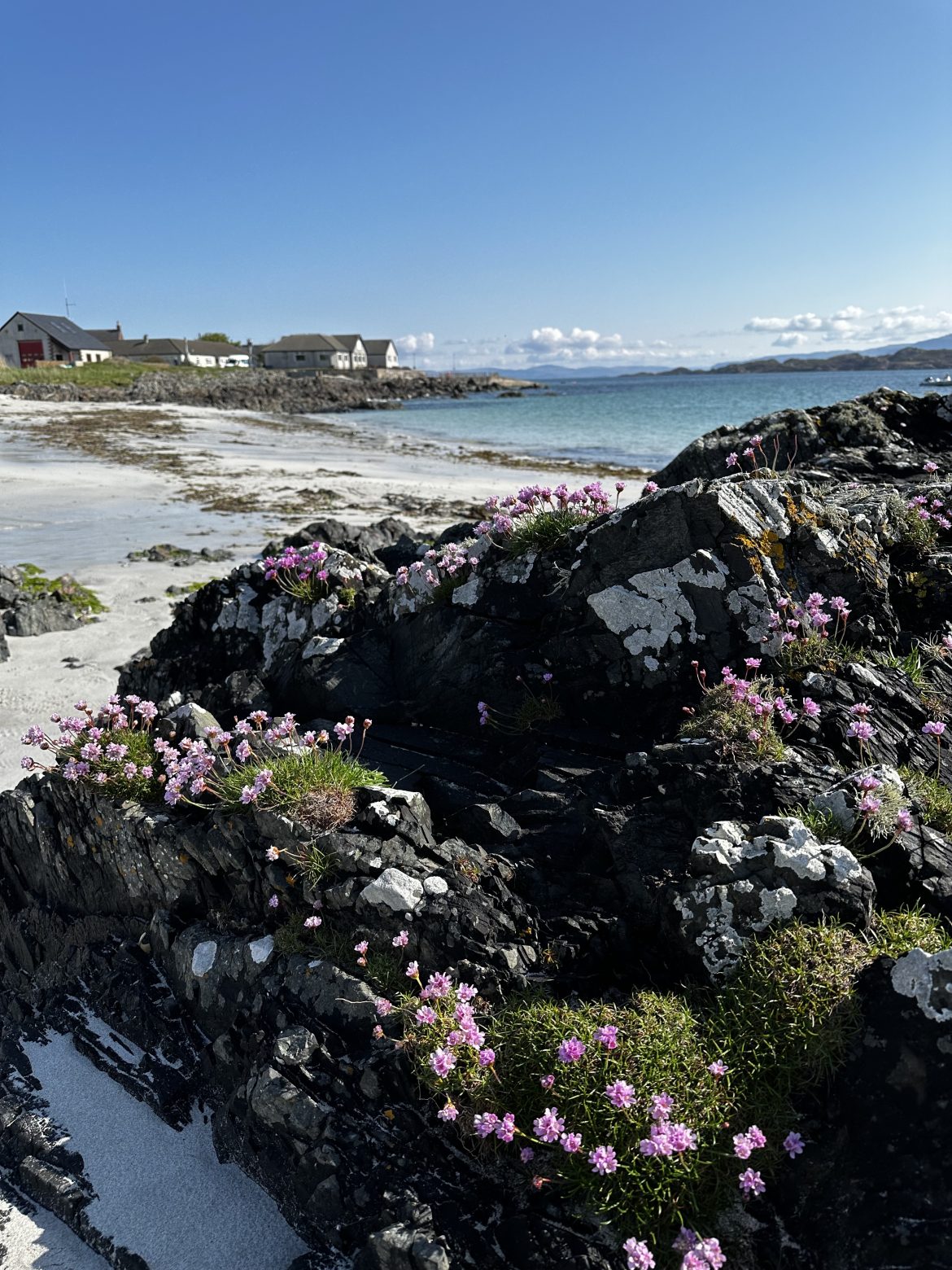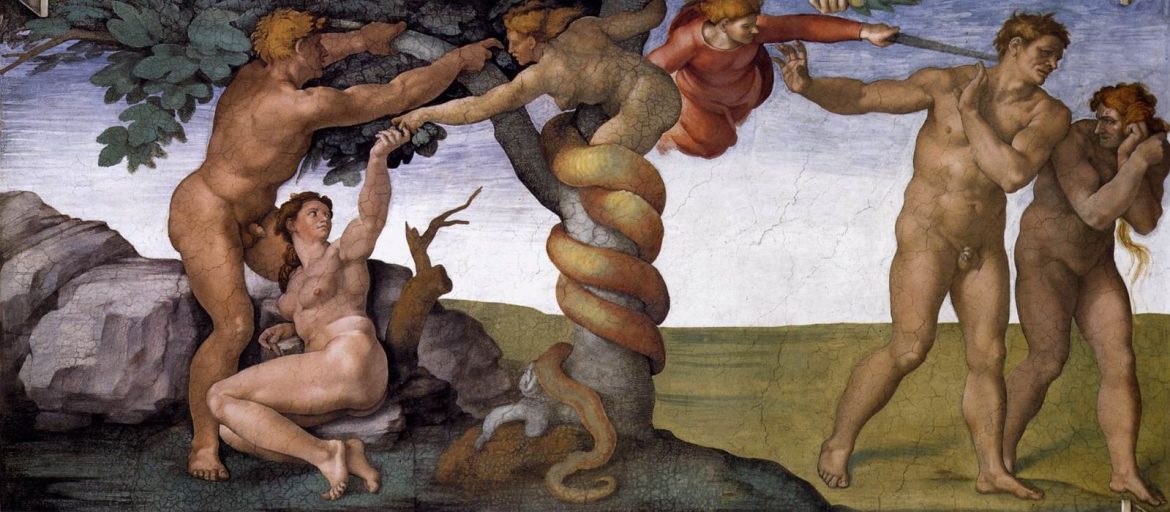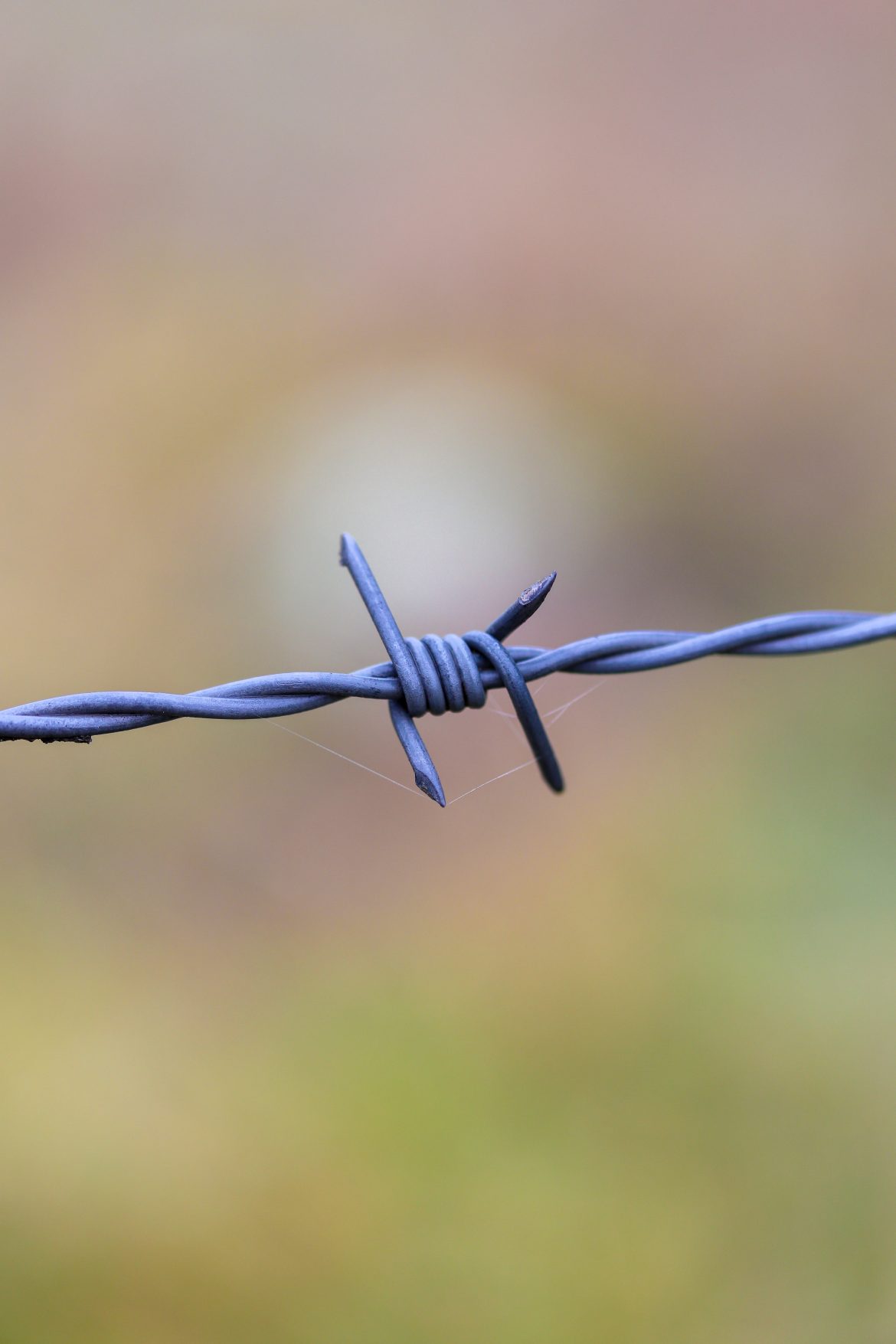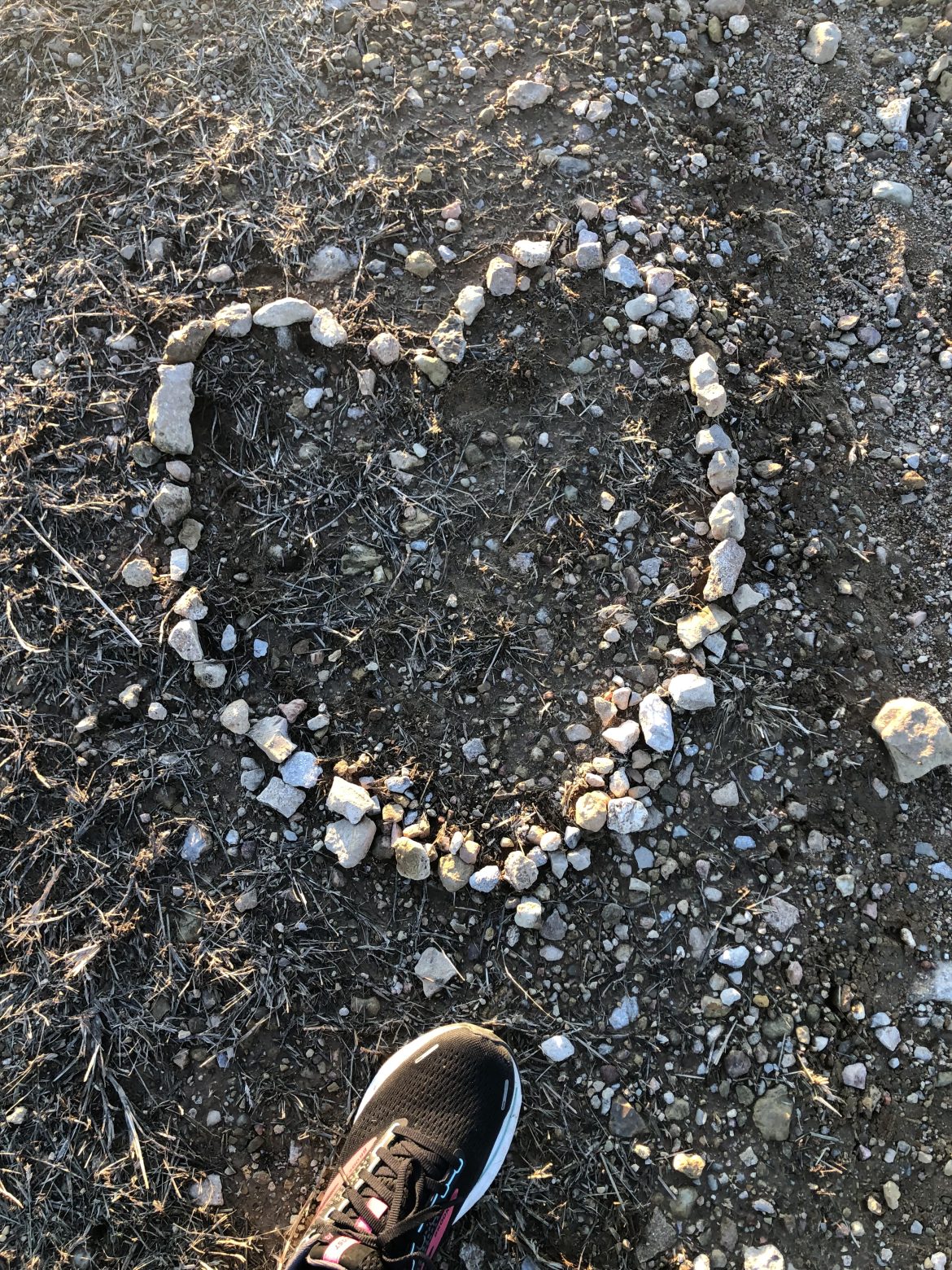A friend asked me what I got out of my pilgrimage to Iona in May. Actually, I am still processing this.
But I do know that I needed to be away from the craziness of America and it’s gun violence. I needed to be in a place of beauty with creative people. One of my thinplaces is ART and creativity. I needed time to create art .
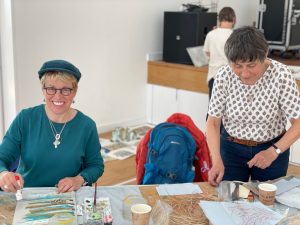

I needed to see water and mountains and all the wonderful colors of creation. I really do experience Jesus outside in Nature. I met Jesus at camp in the mountains of North Carolina when I was eleven years old and experienced more of him on retreats out in the country and the wild with my youth group in jr. high and high school .
Places of beauty truly feed my soul. As Kathy Escobar says, #beautyheals. I truly believe this to be true.
Where have you experienced the beauty of God lately? Take time to be thankful!
How can you plan time in this season ( summer or winter depending upon your hemisphere) to spend more time in beauty and in places where you experience joy…in your thinplace? The Thinplace is the place where you feel God’s pleasure.
One of the ways I know that God exists is that there are so many colors in the world. From weeds and wild flowers, to clouds and waves, the spectrum of colors is dazzling! The fact that there are so many gorgeous colors in our world declares loudly of the existence of the Creator.
Take a walk outside or even just look around where you are notice all the different colors.
Watch the sunrise or the sunset and notice how many different colors you see.
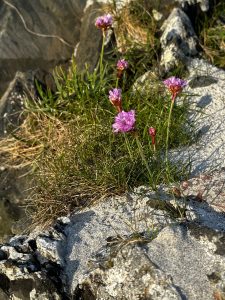
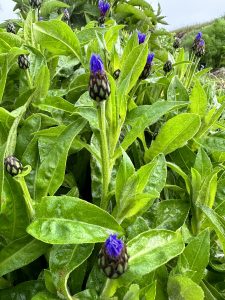
What things help you know that God exists?
“Lord of Mystery, let us feel your presence a the very heart of life, and see and find you in the depth of everyday things. “ Louis Espinal Jesuit Priest murdered in Bolivia
Lord of Life
We celebrate your countless gifts,
In days and nights,
In rainbows and rain,
In touch, dream, and smile,
In partners who love,
In kids who cuddle,
In grannies who listen,
In friends who care,
In dogs that lick,
In hands that sew,
In food on the table;
Yet above all,
In your coming among us,
Walking our roads,
Calling our names,
Enfolding our lives,
Inviting us home. AMEN
by Peter Millar in the Iona Prayer Book
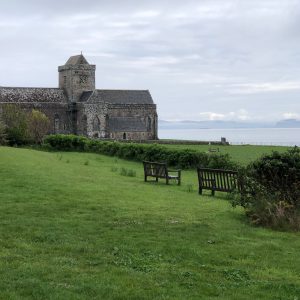
Two ways to experience pilgrimage and the beauty of God….
1. Pete Greig of 24/7 prayer is on a pilgrimage from Iona to Lindesfarne and he is posting everyday
There is a phone app Lectio365 that is a great prayer tool/resource and that you can follow along on instagram or follow on Facebook. @pete.greig on instagram
2. Join me on Pilgrimage (still a couple of spots for this!) AUGUST 28-Sept 4th 2023 to Scotland…starting in Oban and going to Iona from August 30. Finding Your Thinplace Retreat Pilgrimage
Listen to this song and experience the wonder of Creation!
Fathers’ Day in the U.S. will be celebrated this next Sunday. I have thought a lot about my reaction to the idea of God as father. Where does my struggle with God as Father come from? It occurred to me as I basked in the images of the loving, caring, generous father that my struggle begins not with the patriarchal images that we often get hung up on, but with the expulsion from the garden of Eden. How could this possibly be the action of a loving, caring God I have often thought? More like the angry, violent parent I grew up with.
So today I want to do something that you might think a little strange. I am going to reimagine this narrative from the perspective of what I think a loving parent would do and why.
God the mother gave birth to humankind and God the father went out and built a home for his children to live – a beautiful garden dwelling that we call the Garden of Eden. In this wonderful protective environment men and women grew up, walking and playing with God the father and mother in the evenings. All their needs for shelter and food were met by God who hovered around them like a good protective parent. They had a few chores to perform but no responsibility to work for their own provision.
Then they grew up and into the rebellious teenage years when they started to look around and realize that there was a great big world outside the garden that they wanted to explore. In this world, their protective father warned them, there was both good and evil. It is a world, he told them, in which they would now have to toil for their own food and work hard to provide for themselves and their own children. But humankind did not listen. They no longer wanted to be protected from the big bad world, they wanted to find their own way.
So God let them go. God the father sent them away from home out into the world where they would have to fend for themselves. He had given them a good education in how to till the soil and make it flourish but only he knew how much work this involved. Mother God sewed clothes, gave them food and sent them on their way, knowing that life would not be easy for them and that hardship and anguish lay ahead.
God knew his kids would mess up – fighting and killing each other, oppressing and enslaving each other, show greed, prejudice, hatred. He knew he would have to continue watching over them rescuing them as a good father would when they got into trouble, healing them as a loving mother when they got hurt and providing for them when they used up all their resources. But God loved them and knew that for them to come to full maturity they needed to take responsibility for their own actions. To find wholeness and be able to embrace eternal life as God wanted them too he needed to let them go and allow them to make mistakes. He knew that only in this way would they really become mature adults.
I think that it is this kind of narrative that is hidden in the parables and miracles of Jesus:

God the father is the shepherd who leaves 99 sheep to find the one who has gone astray is God our father tirelessly following the most wayward of his sheep.
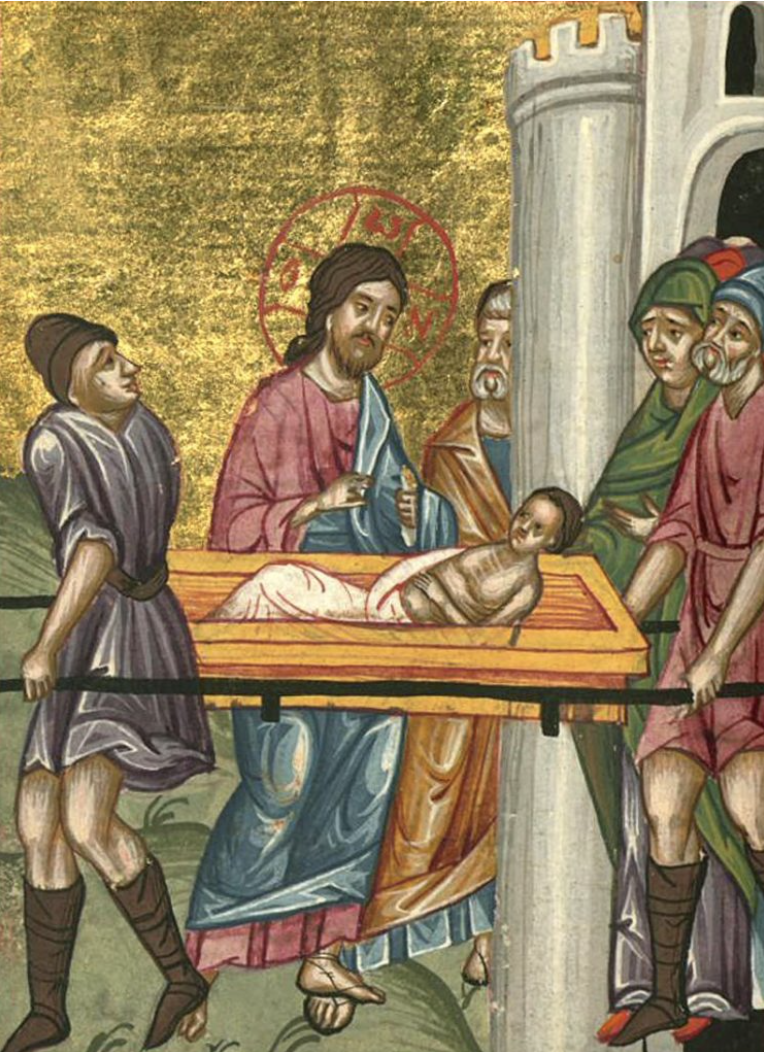
God the father is Jesus reaching out to heal the only son of a widow who has been ostracized by her society and has no means of provision or protection without him.
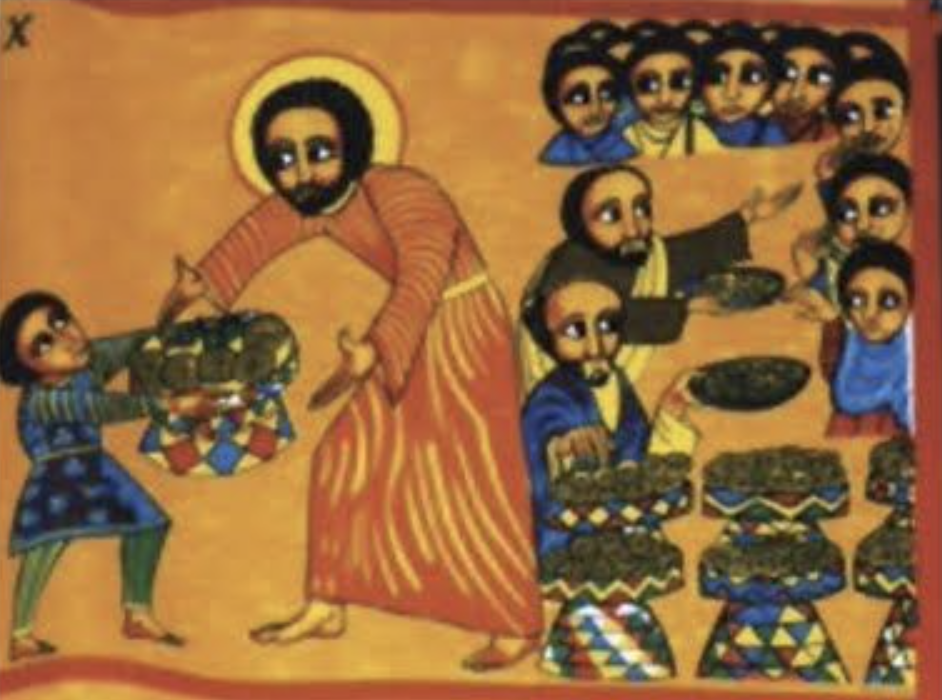 God the father is Jesus sitting on the mountain distributing 2 fish and 5 loaves to feed 5,000 because he wants to remind us of the generosity of good parents.
God the father is Jesus sitting on the mountain distributing 2 fish and 5 loaves to feed 5,000 because he wants to remind us of the generosity of good parents.

Rembrandt van Rijn, The Return of the Prodigal Son, c. 1661–1669. 262 cm × 205 cm. Hermitage Museum, Saint Petersburg public domain
God the Father, is the father who welcomes home all prodigal sons and daughters who have strayed, used up their money, become homeless, turned to drugs, or committed criminal acts and finally recognize that father together with God the mother, really does know best and will still provide a safe haven.
God our Father longs for us to come back home, and at great cost to himself, He has even set up a a well lit pathway – Jesus Christ the way, the truth and the life – to guide us.
For me personally, thinking about this imagery of a loving father protecting, providing for and guiding his children together with images of God the mother working together, is both renewing and healing. What do you think?
This is part of my series on God as Father. You may like to check out the full series:
Meditation Monday: The Father heart of God
Let’s Get Creative for Father’s Day
And for those who want to balance this with maternal images of God check out my posts related to Mother’s day:
Meditation Monday – Connecting to the Mother heart of God
Biblical Maternal Images of God by Shiao Chong
Maternal Images of God – a video and a prayer
Let’s Get Creative – Honouring Our Mothers
Anselm’s Prayer to St Paul: Our Greatest Mother
by Jenny Gehman
*Reprinted with permission from Anabaptist World magazine, AnabaptistWorld.org.*
My husband and I (and a host of others) have lived in our home for 27 years. Let’s just say it was (over) due for a freshening up. Last year, we put our Christmas money toward the project and invited our friend Brenda to help. Brenda is an artist with an eye for interior design and a heart to create hospitable places and spaces.
Even though we know and love Brenda, it felt vulnerable to invite her into the areas of our home in need of change. I had to face things I didn’t really want to face.
Throughout the month we worked together, I fought the urge to hide and cover, coaxing myself to stay open and fully present to the process. I’m glad I did.
“This creates softness,” Brenda would repeatedly say as she recommended paint colors, advocated for plants and hung curtains. “Soft,” she’d say, “is more hospitable, not only to others but to the happenings of the Holy. You want to create softness wherever you can.” And so we did.
It’s interesting because not two days after phase one of Project Softness, I was drawn to a familiar verse of Scripture.
“Take delight in the Lord, and he will give you the desires of your heart” (Psalm 37:4).
I was surprised to learn that “delight” does not mean to enjoy God (although I highly recommend doing so). It means — get this — to be soft.
Who knew? Here was an invitation to do internally in my heart what I was doing externally in my home. To create softness in order to be more hospitable to the Holy.
This word, “delight,” means to be soft, pliable, yielding, supple enough to bend freely or repeatedly.
Suddenly, I’m imagining the Potter and the clay and God making something new out of the old (again, like my home, see Jeremiah 18:1-6).
And also, suddenly, I’m seeing all my own hard edges, my rigidity, resistance and rebellion, those things I’d rather not face. God’s been trying to make something new out of the clay of me recently, and I’ve not been having it. I’ve been attached to the old. Rigid, resistant and rebelliously set in my ways.
To be rebellious is to not cooperate, to have strong feelings of disagreement with the One in authority. Check!
To be resistant is to not accept, to not want to welcome changes or new ideas. Check, check!
To be rigid is to be not able, to be stiff or unyielding, unable to be changed or persuaded. Check, check, check!
I sensed the Spirit saying, “Jenny, I’d like to make something new here. Work with me, daughter! Be soft in my hands and I will make you . . . and I will give you . . . but I can’t do either as long as you are rigid, resistant and rebellious.”
Sigh.
Back on the home front, hubby took a week off work to paint, and I spent time clearing the clutter and gathering the recommended resources. We set aside a workday to put the “new” in place.
When Brenda arrived at our door, she mentioned she had just come from another house where she was invited to give input on design. The owner of that house, however, was rigid, resistant and rebellious (to use my words). Every suggestion Brenda gave was met with rejection or objection. The owner’s ways were set in stone (like my heart), so there was nothing Brenda could do to effect a more favorable outcome.
“I like working with you,” Brenda said as she turned to me, “because you are so open to change.”
If only the same could be said of my heart!
As I write this, I am sitting in my “new” living room. It is fresh, airy and peaceful. I feel welcomed and safe, as if I’m gently falling open. My hard edges soften.
I am putty in the Potter’s hands. Delighting, I yield to divine ways and wisdom.
“A new heart I will give you,” God says, holding the clay of me, “and a new spirit I will put within you; I will remove from your body the heart of stone and give you a heart of flesh” (Ezekiel 36:26 Amplified).
In other words, God will create softness.
My response is a simple song.
Have thine own way, Lord, have thine own way. Thou art the potter, I am the clay. Mold me and make me after thy will, while I am waiting, yielded and still.
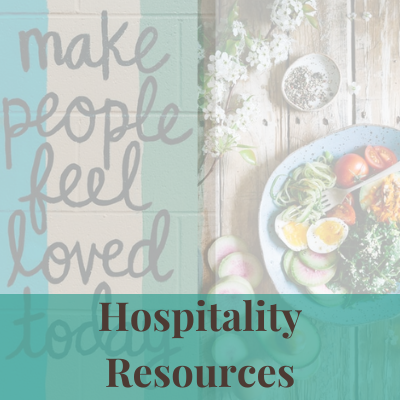 Looking for hospitality inspiration? We have an entire resource page dedicated to hospitality. Find recipes and reflections on numerous hospitality topics, including Celtic hospitality, prayers, and liturgies. Click on Hospitality for more!
Looking for hospitality inspiration? We have an entire resource page dedicated to hospitality. Find recipes and reflections on numerous hospitality topics, including Celtic hospitality, prayers, and liturgies. Click on Hospitality for more!
As many of you know, last week I contracted COVID. This is my first encounter with the beast, and fortunately it has been mild. I am back out working in the garden and exercising though still a little low on energy. My assistant Melissa also has COVID so as you can imagine there is not much work being done around here. Which is how it should be. As I mentioned in my Meditation Monday: The Post That Almost Wasn’t yesterday: “I am reminded as I write this that relaxation is often one of the spiritual practices of summer and I realize in the season of illness that the same practice is necessary.”
As well as resting and relaxing, I did a lot of reading, most of it science fiction. Evidently, according to Yes Magazine’s article Why Young Readers Find Hope – And Escape – In Sci-Fi and Fantasy there are good reasons for this, reasons that apply not just to the young either. “First among them may be the simple relief that such stories offer from a daily reality that may still seem dark, dangerous, and uncertain.” We are all suffering from reality overload and fantasy often helps us grapple with complexity, diversity and uncertainty. “What better way to deal with the uncertainty of this time than with forms of fiction that make us comfortable with being uncomfortable, that explore uncertainty and ambiguity, and depict young people as active agents, survivors, and shapers of their own destinies?”
I agree wholeheartedly with this assessment. I have always enjoyed sci-fi and for more than its escape value. It has always helped me embrace diversity, uncertainty and complexity in ways that continue to enrich my faith and my life. Inspirational posts on Godspacelight help me do the same. Last week I found Jenny Gehman’s Borders, Boundaries and Barbed Wire to be particularly inspirational. Her comment “Extending hospitality is not always a neat affair in a tidy, controlled environment. Not everyone is easy to welcome. Hospitality is always holy but sometimes hard. “ is one I resonate with deeply. As well as that June Friesen’ who gives us daily inspiration through her posts on the Godspacelight Community Facebook group contributed a beautiful post on My Friend The Dove and Sue Duby, another of our regular writers wrote about the diversity and uniqueness of all of us in her post Unique. Lilly Lewin in Freerange Friday: The Dust of the Rabbi reminded us that the ancient Jews said that if you find a good rabbi, you should “cover yourself in the dust of his feet and drink in his words thirstily.” Don’t miss this fascinating post.
As I sit here this morning I sit in gratitude of all that surrounds me refreshing, renewing and healing my body and soul. I am very grateful for the vaccines and the medicines that contributed to the fact that I have only had mild symptoms of COVID. I am very grateful for the many people who have offered to help and above all I am grateful for the God who is companion, mentor, teacher and sustainer in times like this.
Relax in the presence of God,
Let the peace of Christ wash over.
Listen to the Spirit encouraging you
To slow down and rest.
Let go your expectations.
Give your body time to heal.
Enjoy the companionship of God.
Confident that nothing more is necessary.
Many blessings
Christine Sine.
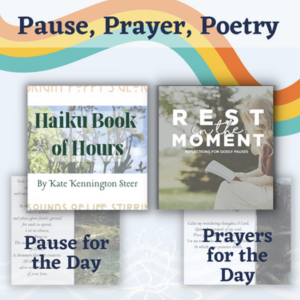 Whether you are praying the stations of the day, in need of resources for rest, hoping to spark joy and find wonder, or simply want to enjoy beautiful prayers, poetry, and art – our shop has a digital downloads section with many options! Christine Sine’s book Rest in the Moment can help you find pauses throughout the day and you may find inspiration in our prayer cards set Prayers for the Day or Pause for the Day. You may find your curiosity piqued in the free poetry and art download Haiku Book of Hours.
Whether you are praying the stations of the day, in need of resources for rest, hoping to spark joy and find wonder, or simply want to enjoy beautiful prayers, poetry, and art – our shop has a digital downloads section with many options! Christine Sine’s book Rest in the Moment can help you find pauses throughout the day and you may find inspiration in our prayer cards set Prayers for the Day or Pause for the Day. You may find your curiosity piqued in the free poetry and art download Haiku Book of Hours.
by Christine Sine
Last week I had great intentions of writing a post about rhythms and seasons which was very much in keeping with our current theme of Seasonal Spirituality. As I mentioned to our writers when I first suggested this, some of us are heading into summer, others towards winter and many of us have spiritual practices that are specific to and reflective of the season. What sustains you in summer, or in winter? Is it the opportunity to slow down and participate in a spiritual retreat? Is it pilgrimage? I am very envious of Lilly Lewin heading to Iona on pilgrimage again in August and would love to make pilgrimage more a part of my own summer rhythm. For those heading into winter, perhaps it is cosy evenings curled up by the fire with a good book. What spiritual practices nurture you as you endeavor to live out a wholehearted commitment to Christ? How do the seasons impact these? I know that for Tom and me summer spirituality often revolves around hospitality. These are just some of the thoughts that come to my mind as I think of this topic? What comes to your mind?
Over the next few weeks I became obsessed with the idea of seasonal spirituality. But what kinds of seasons I wondered? There are so many different ways that we can define the months and seasons of the year. There are the liturgical seasons, the meteorological seasons, the lunar seasons, seasons to celebrate diversity, as well as other more subtle seasons like school seasons, seasons of work and rest, seasons of life. Our current topic of Seasonal Spirituality opens up so many possibilities and I hope you find the idea of being creative with our spiritual practices as interesting as I do.
This topic came out of my recognition that church leaders rarely provide us with spiritual practices that are relevant to the season. Several years ago I started asking pastors, “How do you prepare your congregations for the spirituality of the summer – for that season of the year when people stop coming to church and express instead a spirituality of summer vacations, of hiking and biking and swimming? Church leaders often complain because people don’t come to church over the summer or when the weather gets cold and rainy in the winter, but rarely help them recognize the spirituality of the ordinary activities in which they engage.
Over the last several years I have discovered the spirituality of walking in the rain in winter, and walking barefoot in summer. I have enjoyed the spirituality of play in both these seasons and of going on pilgrimage as well.
This last week however, I experienced another rhythm that called for different spiritual practices – I contracted COVID. Five days in quarantine, with fortunately very mild symptoms and another 5 wearing masks all the time. Cancelling lunch dates and optometry appointments. Forgoing walking the neighbourhood, and doing my morning exercises. Hardest of all cancelling our vacation on Mayne Island in Canada with close friends we have not seen since before the pandemic.
Illness is a season that shapes all of our lives as we all found out during the days of COVID lockdown. I am reminded that the marriage vows state “in sickness and in health”, recognizing that both these seasons will come to all of us. What kinds of spiritual practices sustain you through times of illness? For me it is just giving myself permission to rest and take time to heal. Reading the psalms and a good book, walking around the garden without feeling compelled to work in it. Letting go of expectations and resting in the presence of God with the confidence that nothing more is necessary. Our dog Goldie seemed to know exactly what to do. She jumped on our bed, something she is rarely allowed to do and took a few more naps. I soon realized I needed to learn from her. So this post almost didn’t happen, but after a couple of days of rest I felt much revived and able to write again.
I am reminded as I write this that relaxation is often one of the spiritual practices of summer and I realize in the season of illness that the same practice is necessary.
Relax in the presence of God,
Let the peace of Christ wash over.
Listen to the Spirit encouraging you
To slow down and rest.
Let go your expectations.
Give your body time to heal.
Enjoy the companionship of God.
Confident that nothing more is necessary
(c) Christine Sine 2023
By Jenny Gehman
reprinted with permission from Anabaptist World magazine
My mother wore a large safety pin on her shirt every day for four years — the years when Donald Trump was president of the United States. Believing his presidency served as a threat to those living on the margins, specifically to those in the disabled, BIPOC and LGBTQ communities, my sweet Mama wanted to communicate to them (and to all) that they would be safe in her presence. That she would do them no harm. Her safety pin served as a visible representation of this desire and commitment.
I recently gathered up the courage to ask my adult son how he thought other people felt in my presence. He replied with an immediacy that surprised me. Safe, he said, as if right on cue. His answer took my breath away and brought tears to my eyes. Of all the things he could have said! This was a gift and a grace.
I’m under no illusion that this is how it has always been or still is today on any consistent basis. I am all too aware that, in my presence, others have felt at times condemned, judged or, God forbid, belittled, shamed, insignificant or unacceptable.
Perhaps it would do me well to wear my mother’s safety pin, not so much as an outward sign to others but as a reminder to my own dear self to remain a safe space for others to land.
Over the years, I have come to believe that the center of hospitality, about which I am passionate, is not about the creation of delicious food, beautiful tables or spotless homes. It is about the creation of safety.
In hospitality, the helpful questions to ask are not so much, “What can I cook for dinner? or “How should I decorate my home?” but “What can I do to help you feel safe?” “What do you need in order to feel safe here, with me, with us?”
Have you noticed? It’s becoming harder to feel safe in this world of ours. Just yesterday a friend who recently returned to the U.S. after 20-plus years in Ireland relayed to me a rising panic she felt to get out of here and back to her European home. Back, she said, to a place where people don’t carry guns, where kids are not killed for knocking on doors or pulling into driveways or just plain going to school. Back to where going to the bank or the grocery store would not pose a threat to her life. I hear her loud and clear. The threats she feels are all too real.
So tell me, please, how do we welcome the stranger, those foreign to us in one way or another, when we feel threatened by them? The sad answer is: We cannot. When we feel threatened (and not just physically), we close ourselves off or arm ourselves up. We walk around in a defensive posture, and we shoot one another with bullets and blame. Our fear makes us unsafe for others.
One thing I struggle with about -Jesus is the way he seemed to have zero interest or investment in self- protection. It intrigues me, but mostly irks me. I’d rather not follow him there.
When we prioritize our own safety and security, we close our doors and lock them twice. We view others with suspicion. We keep our guard up and our weapons close. We are more concerned with keeping others out than welcoming them in. Not only in our personal lives or homes, but in our churches, communities, and countries.
We are strongly bordered and highly boundaried. Bumping up against barbed wire doesn’t feel very welcoming to those coming our way.
Extending hospitality is not always a neat affair in a tidy, controlled environment. Not everyone is easy to welcome. Hospitality is always holy but sometimes hard.
Who, because of their ideologies or identities, feels like a threat to us? To whom are our minds, hearts, churches or communities closed? Who are those bumping up against our barbed wire, and what are we going to do about them? For them? Whose safety will be paramount, ours or theirs?
“Welcome one another, therefore,” the Apostle Paul said, “just as Christ has welcomed you” (Romans 15:7, NRSV).
How do others feel in our presence? What can we do to help them feel safe?
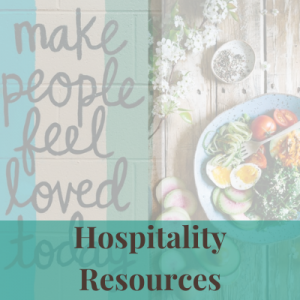 Looking for hospitality inspiration? We have an entire resource page dedicated to hospitality. Find recipes and reflections on numerous hospitality topics, including Celtic hospitality, prayers, and liturgies. Click on Hospitality for more!
Looking for hospitality inspiration? We have an entire resource page dedicated to hospitality. Find recipes and reflections on numerous hospitality topics, including Celtic hospitality, prayers, and liturgies. Click on Hospitality for more!
When you hear the word DISCIPLE what do you think of ? Do you think of the twelve disciples in the Bible? Do you think about being a disciple of Jesus yourself? What does being a disciple actually mean or look like? What do we do and how do we act and take action as a disciple of Jesus?
Think about when Jesus invited people to become his disciples.
Jesus invited them to become Followers.
To become pilgrims with him on the road.
Learning
Listening
Noticing
Getting his dirt on them!
Come Follow Me! Was the Invitation from Jesus.
Not come memorize more verses, or believe more things, or know more doctrine.
Come Follow Me!
Do the things I am doing.
Love the people I love.
Heal, touch, listen to the least of these.
Be with those the religious leaders thought were sinners.
Learn to love God and Love Others.
Love and forgive your enemies.
Old and Young, tax collectors, fishermen, zealots, women and men, all became Followers,
All were invited to be his DISCIPLES ….FOLLOWERS
Those who were learning to walk in his ways and do the things he did.
“The idea of discipleship can be summed up with one biblical key word: imitation. To be a disciple meant you were following a rabbi, a teacher. But the goal of a disciple wasn’t merely to master the rabbi’s teachings; instead, it was to master his way of life: how he prayed, studied, taught, served the poor and lived out his relationship with God day to day.
Jesus himself said that, when a disciple is fully trained, he becomes “like his teacher” (Lk 6:40). When St. Paul formed disciples, he exhorted them not just to remember his teachings but also to follow his way of living: “Be imitators of me as I am of Christ” (1 Cor 11:1). He exhorted them to lead others in the same way (2 Tim 2:2).
The word the Bible uses for “disciple” is mathetes, which means “learner.”The ancient Jews had a saying that captures this idea of discipleship and transformation. They said that if you find a good rabbi, you should “cover yourself in the dust of his feet and drink in his words thirstily.” Sri goes on to explain:
The expression probably draws on a well-known sight for ancient Jews: disciples were known for walking behind their rabbi, following him so closely that they would become covered with the dust kicked up from his sandals.This would have been a powerful image for what should happen in the disciple’s life spiritually.
Disciples were expected to follow the rabbi so closely that they would be covered with their master’s whole way of thinking, living and acting.
Edward Sri, Into His Likeness: Be Transformed as a Disciple (San Francisco: Ignatius Press, 2017).
Whose dust are you walking in theses days?
What kind of dust are you getting on you?
Are you walking far behind Jesus? or Up close getting his dust on you?
Or are you trying to run ahead of the The Rabbi, out on your own so you aren’t dirty at all?
How are you learning to live more and more like Jesus?
As you walk around your neighborhood, or take a walk in the woods this week, notice the dirt and dust on the path.
Consider the Path you are on physically and metaphorically.
Consider the rabbi your are following…Is it Jesus or something/someone else?
Who does your life look like?
How is your dust?
How are you following Jesus these days?
Are you getting His dust on you?
Are you close enough to get His dust on you?
Or are you so far away that you don’t look anything like Jesus right now?
What can you do this summer to get more dust of Jesus on you?
I grew up with a very different view of being a disciple. one of rules to follow, stuff to memorize, etc. Not enough action in loving my neighbor or doing the things Jesus did…I wasn’t encouraged to live out the sermon on the mount, the beatitudes. That was just a nice sermon, sadly not a way of living. I want to be about loving my neighbor of all colors and creeds and standing up for equality and taking action for justice. I want to be a FOLLOWER, a DISCIPLE who is covered in the dust of Rabbi Jesus.
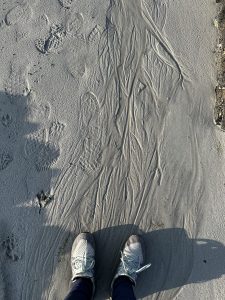
quote found HERE https://focusequip.org/in-the-dust-of-the-rabbi-living-as-a-disciple-of-jesus/
You need help in getting dusty with Jesus this summer, you can kick start your practices by downloading THE GIFT of SACRED SUMMER . Includes practices that take five minutes and deep dives too…Gift of Silence, Rest, Play, Etc. For Individuals, family and small groups as well as a church kit here.
As an Amazon Associate, I receive a small amount for purchases made through appropriate links.
Thank you for supporting Godspace in this way.
When referencing or quoting Godspace Light, please be sure to include the Author (Christine Sine unless otherwise noted), the Title of the article or resource, the Source link where appropriate, and ©Godspacelight.com. Thank you!

